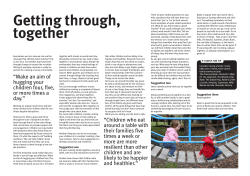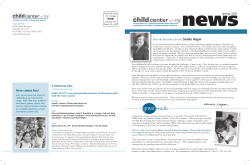
Family Values ■
p Pushing Past the Past ■ erhaps the biggest trap that children of alcoholics can fall into is to see ourselves as victims of events that were basically beyond our control, but which will somehow always keep us trapped. That’s not only self-defeating; it isn’t even true. Once you learn to see the past for what it is, past, and the present for what it is, a present, you’re not going to find a good reason to be stopped by anything at all—especially mom or dad’s problem, or our memories of it. Each of us may have had to grow up playing our Shaking shadows. Slipping the grip of a parent’s addiction starts when you parents’ games, question- learn to love the child they forgot to. ing our value, living in the shadow of alcoholism or chemical dependency. But that doesn’t mean we’re stuck there. And even if we did learn to pretend that things were fine when they weren’t, it’s okay to stop pretending now. How? By telling the truth about who we are and where we’ve been, and accepting and caring for ourselves—starting now, if you haven’t started already. There never has been—and never will be—a better time to put the past in its place. So why wait? ■ This is one in a series of publications on drugs, behavior, and health published by Do It Now Foundation. Please call or write for a list of current titles, or visit our web site at www.doitnow.org. Box 27568 ■ Tempe, AZ 85285-7568 ■ 480.736.0599 DIN 808 All Rights Reserved 7/07 Family Values ■ i t’s sometimes called a “three-generation” disease, passed from parent to kids and grandchildren, like blue eyes or freckles. But it’s way more serious than blue eyes and freckles, as anybody who’s lived through the agony of parental alcoholism knows. According to the best estimates, about one in eight Americans—more than 30 million of us—are products of alcoholic homes. And the National Institute on Alcohol Abuse & Alcoholism says that 6.6 million kids are living with an alcoholic parent now. What’s life like for them? Well, it doesn’t look like the families in Norman Rockwell paintings or feel much like the Baileys in “It’s a Wonderful Life.” More often, it’s like an Shadow dance. Kids who grow up endless marathon of “Marin the shadow of addiction often ried With Children” epicope by withdrawing or withholdsodes, where growing up is ing all but “safe” feelings. a constant struggle to cope with disappointment and stress and embarrassment. It’s a place where a kid’s needs are often downplayed or ignored, and family life centers on the psychological “games” of the drinking parent. Consider: k 55 percent of all family violence occurs in alcoholic homes. k Incest is twice as likely among daughters of alcoholics than their peers. k Children of alcoholics are three times more likely to become alcoholics than the general population. k 50 percent of children of alcoholics marry an alcoholic; 70 percent develop a pattern of compulsive behavior as an adult, including alcoholism, drug abuse, and overeating. And no statistic can measure the emotional pain that children of alcoholics grow up with and carry into adulthood. g rowing up in a home with an alcoholic parent can leave emotional scars that last way beyond childhood. Until recently, children of alcoholics weren’t even considered all that different from other kids with problems. Often, they were ignored by treatment programs, which focused on the alcoholic parent. Now that’s changed. Today, therapists recognize the special problems and needs of children of alcoholics (or COA’s), and family therapy has become a big part of alcoholism rehabilitation. And treating the problem—rebuilding self-esteem and re-learning to communicate and trust and love— begins with identifying what, exactly, went wrong in the first place. And believe it or not, it isn’t always obvious. Denying the Obvious ■ One reason identifying children of alcoholics can be so difficult is that many kids—maybe even most kids— don’t like to admit that there are troubles at home. That’s because denial can play as big a role in the alcoholic family as it does in alcoholism itself. When a drinking parent denies that drinking is a problem, kids usually learn pretty fast that one thing that’s virtually guaranteed to cause trouble is to talk about it—or even think about it much, at all. The conflict that comes from denying the obvious and the struggle to keep up appearances for outsiders can trigger emotional shockwaves for Life’s a ball. Living with an alcoholic parent is like playing with a rubberband ball: Okay, COA’s that can reveruntil something snaps; then it can hurt. berate for years. Common problems can include: k Guilt. The child suspects that he or she somehow caused the parent’s drinking. k Anxiety. Fear of arguments or violence can cause constant worry and emotional hypervigilance. k Embarrassment. The child is ashamed of the family “secret” and withdraws from friends or other family members. k Confusion. A drinking parent’s mood swings and unpredictability can cause uncertainty and inner turmoil in the child about what to do next. k Inability to Trust. Repeated disappointments and broken promises by an alcoholic parent can make it hard for a child to trust and develop close bonds with others. k Anger. The child usually resents the drinking parent and may transfer the anger to the non-drinking parent for lack of support and protection. k Depression. Feelings of loneliness and helplessness are common—and almost inevitable. In an alcoholic family, a child’s need for love, support, and emotional nurturing is often marginalized or forgotten altogether in the endless tug-of-war between the family and alcoholism. And with few role models for demonstrating how emotions can be expressed positively, the child adapts to chaos in order to survive. ■ Responsible Child: Some kids assume the role of the parent, by feeding and caring for younger brothers and sisters. ■ Adjuster Child: Here, kids simply accept whatever behavior a drinking parent dishes out. Many hide and become quiet and withdrawn. ■ Acting-Out Child: Some children assume blame for their parent’s drinking and deflect attention from family problems by creating problems of their own at home and school. ■ Placater Child: These kids ignore their own unhappiness to comfort others. Some become family clowns and try to cover problems with jokes. According to Dr. Black, children of alcoholics can become such experts at playing their roles that they often create situations as adults where they continue to act out the family drama. This strong role identification, she argues, is one reason that many adult children of alcoholics marry problem drinkers. The Healing Process ■ Family Dramas ■ The constant hurt and confusion of the alcoholic household often reveals itself in children protecting themselves by lying, suppressing feelings, and withdrawing from close relationships. Having learned these defenses in adolescence, children of alcoholics tend to repeat them in adulthood, usually without realizing the connection. One leading therapist, Dr. Claudia Black, says that children from alcoholic c homes tend to adopt a distinct role within the family. Dr. Black, a COA herself and national advocate for children’s rights, cites four common roles that recur in alcoholic households: Probably the most difficult step in the healing process is the first one—for the child to openly identify the problem and begin to talk about his or her sadness and anger. Out of love or fear, most children try to keep family problems a secret. Believing that they’re the ones with the problem and may even be somehow to blame, children with drinking parents often hide behind a wall of denial and defensiveness. Identifying a child of an alcoholic usually involves little more hildren of alcoholics can become such experts at playing their roles that they create situations as adults that allow them to continue to act out the family drama. than close observation of changes or extremes in the child’s behavior. A number of behavioral signs can warn of a parental drinking problem, including: k k k k k k k k School absences or truancy Withdrawal from classmates and friends Frequent illness or physical complaints Drug or alcohol abuse Overly aggressive play Delinquent behavior Under-achievement in school Emotional distance from peers Once a child of an alcoholic is identified and begins to confront his or her suppressed guilt and fears, the real process of recovery can begin. Since learning about the dynamics of alcoholism is important to the process, many therapists recommend such self-help programs as Al-Anon, Children of Alcoholics, or Adult Children of Alcoholics. Some recommend dietary changes (especially lowsugar diets), and such stress-reduction techniques as meditation, aerobics, and visualization or affirmation exercises. Still, whatever form treatment takes, children of alcoholics need to develop a healthy sense of selfesteem—free of guilt, fear, and blame—to see themselves as okay even when those around them may not be. It might seem like a cliché, but before any of us can ever really trust and love others, we really do have to learn to love and trust ourselves. If Your Mom Or Dad Has a Problem… s ome of the things we’ve talked about in this pamphlet may sound familiar. In fact, if one of your parents is an active alcoholic, it may describe what’s going on in your family right now. If that’s the case, you’re due for some good news, and here it is: There are things you can do to help clear up the problem. l Step 1: The first thing to do is to realize that you aren’t alone. Millions of kids have been through the same problem and have felt the same fears. These kids (many of them adults now) have been where you are and know what you’re feeling, and they know how to help. l Step 2: The next thing to do is to tell someone. If you have a cool teacher or friend or a favorite aunt or uncle, talk with them and don’t hold back. Even though it might seem easier and safer to keep help? Don’t be afraid things a secret, what really hurts you over the long term is keeping problems stuffed inside yourself. Need or embarrassed to ask for it. Others understand and they can help. l Step 3: The last thing to do if you’re the child of an alcoholic is to realize that it’s not your fault. Your parents may love you, but your parents have a problem. The best way you can help them is to help yourself. Call a local Al-Anon or AlaTeen chapter (they’re listed in the white pages of the phone book) or write the Children of Alcoholics Foundation, 540 Madison Avenue, New York, NY 10022. For referral to services in your area, call the Boys Town National Hotline at 1-800-448-3000. And do it now. Drinking or drugs may be your family’s problem today, but they don’t have to be a problem forever. ■
© Copyright 2025





















